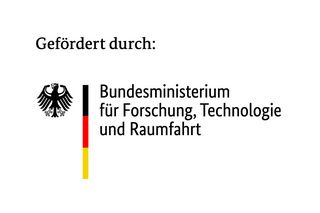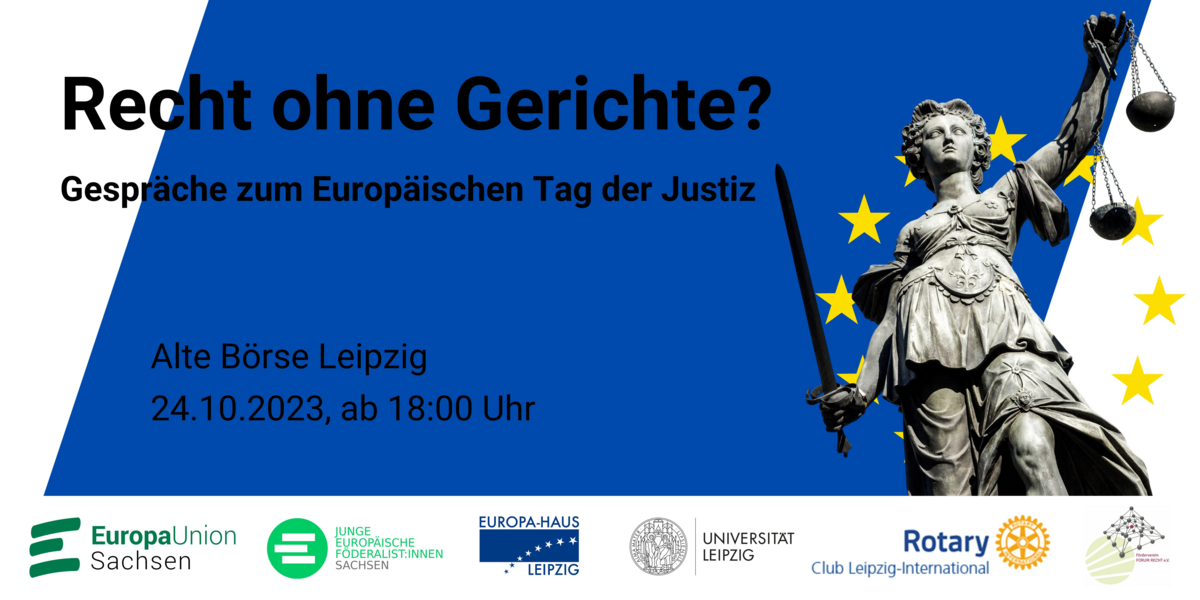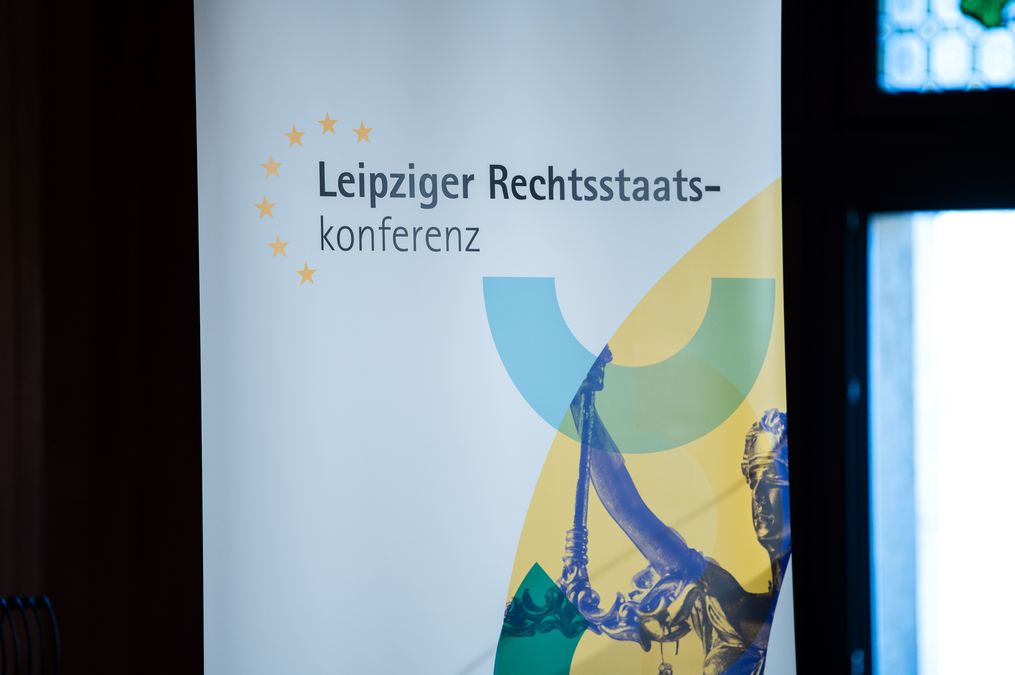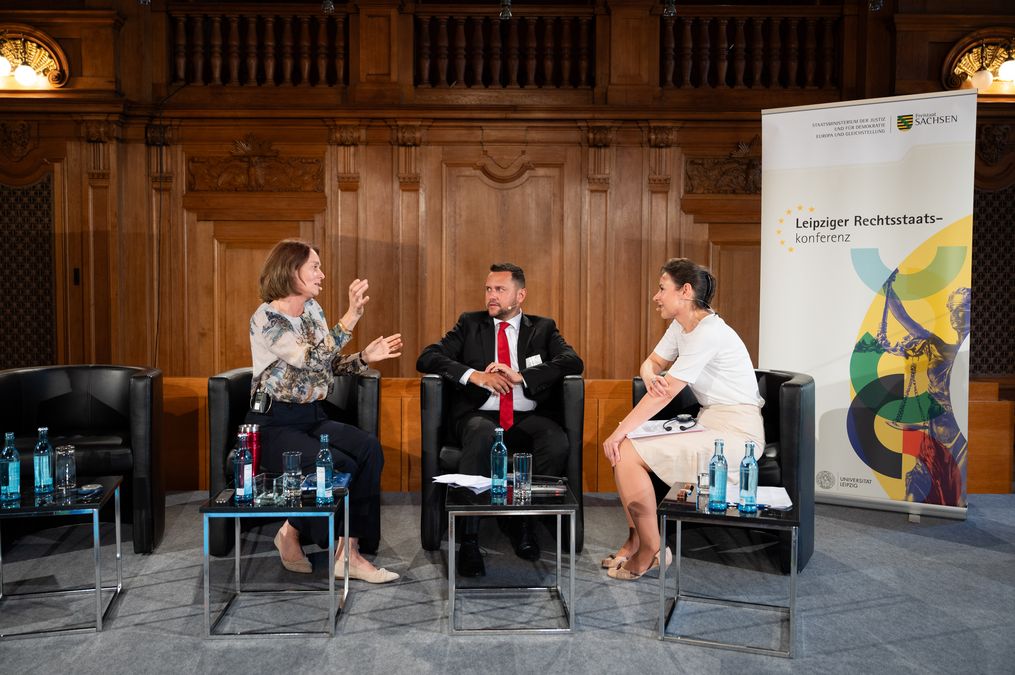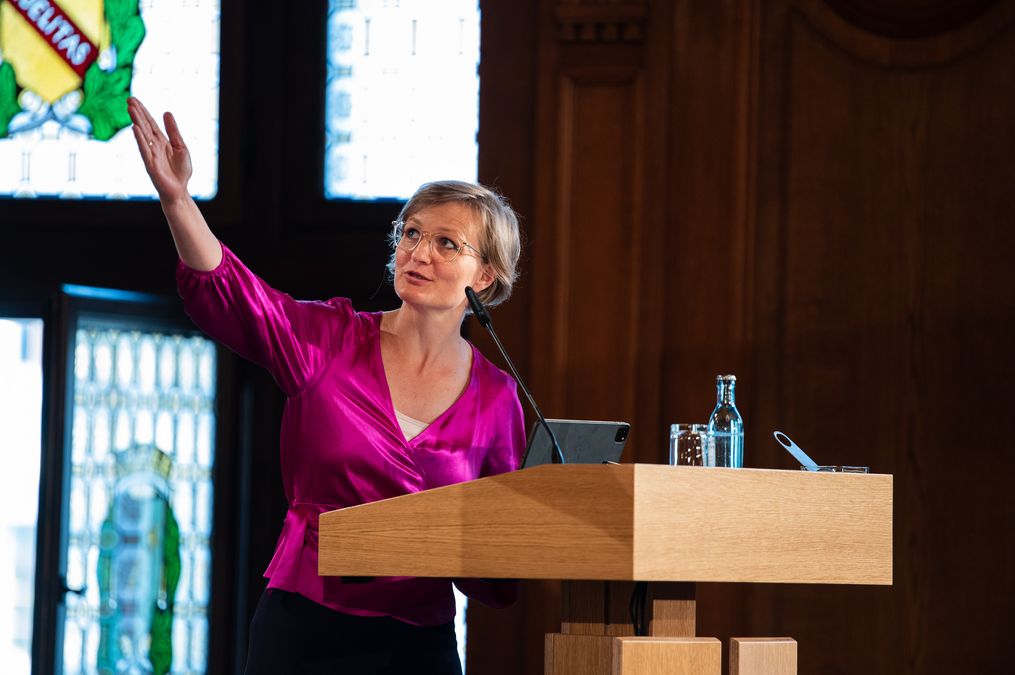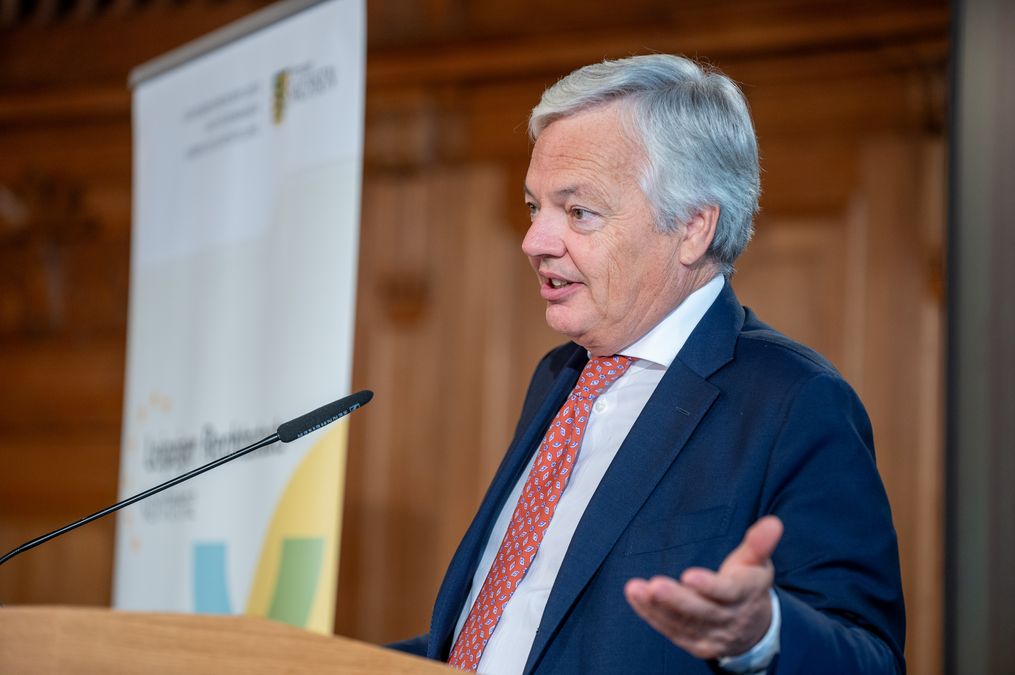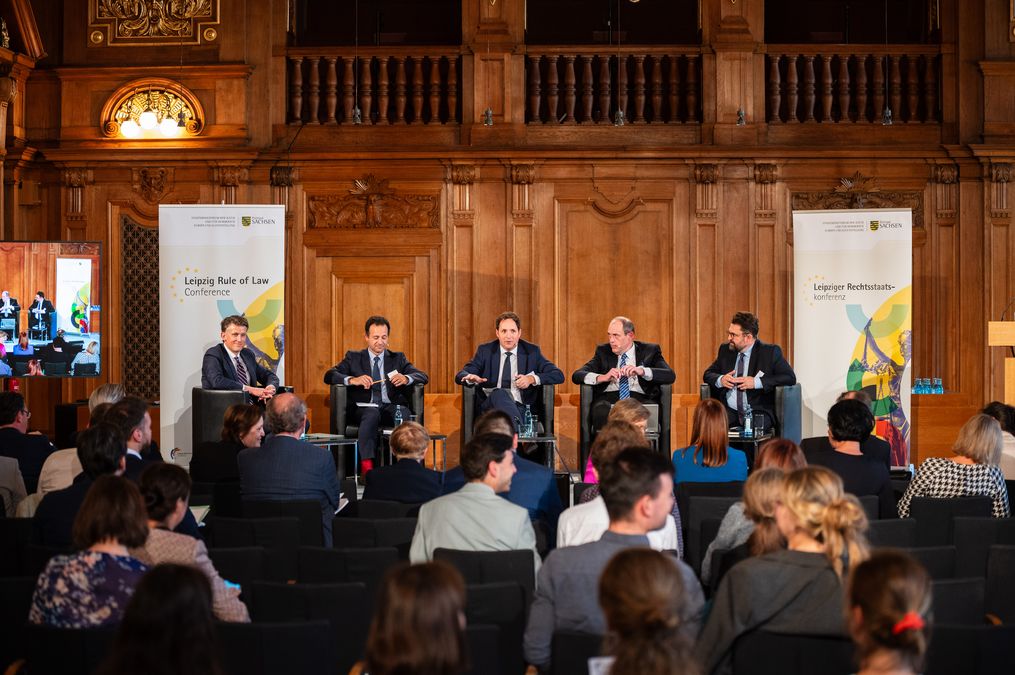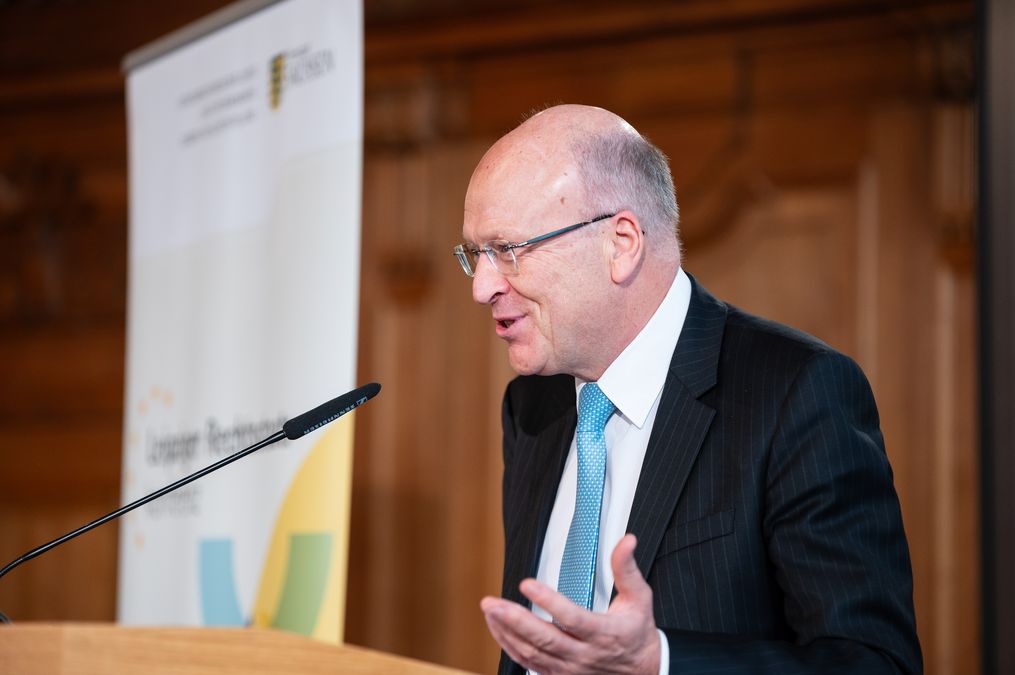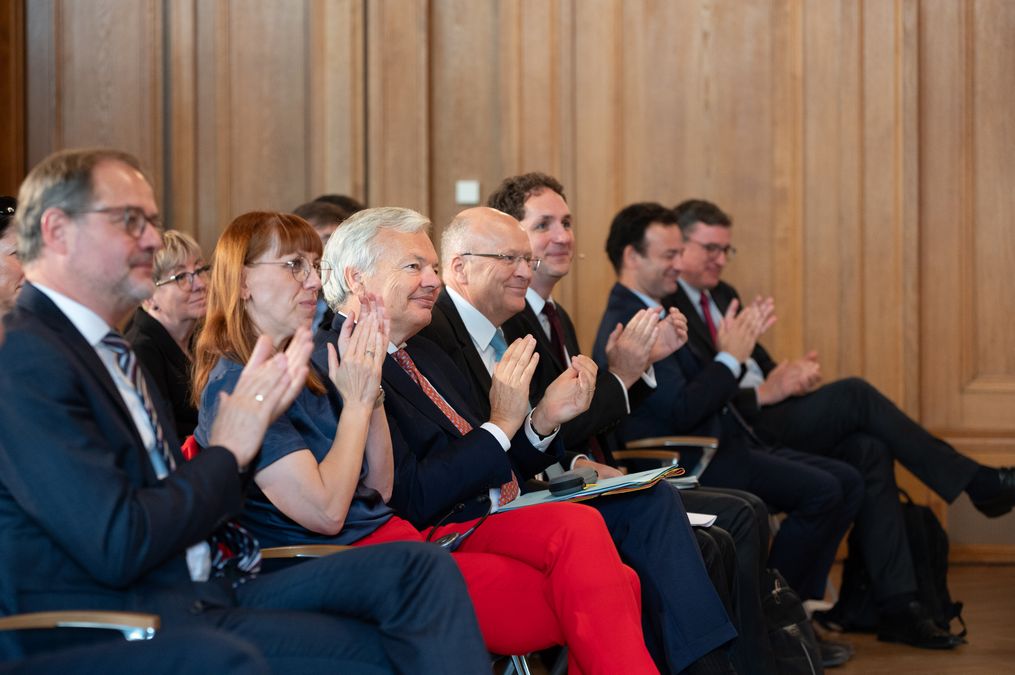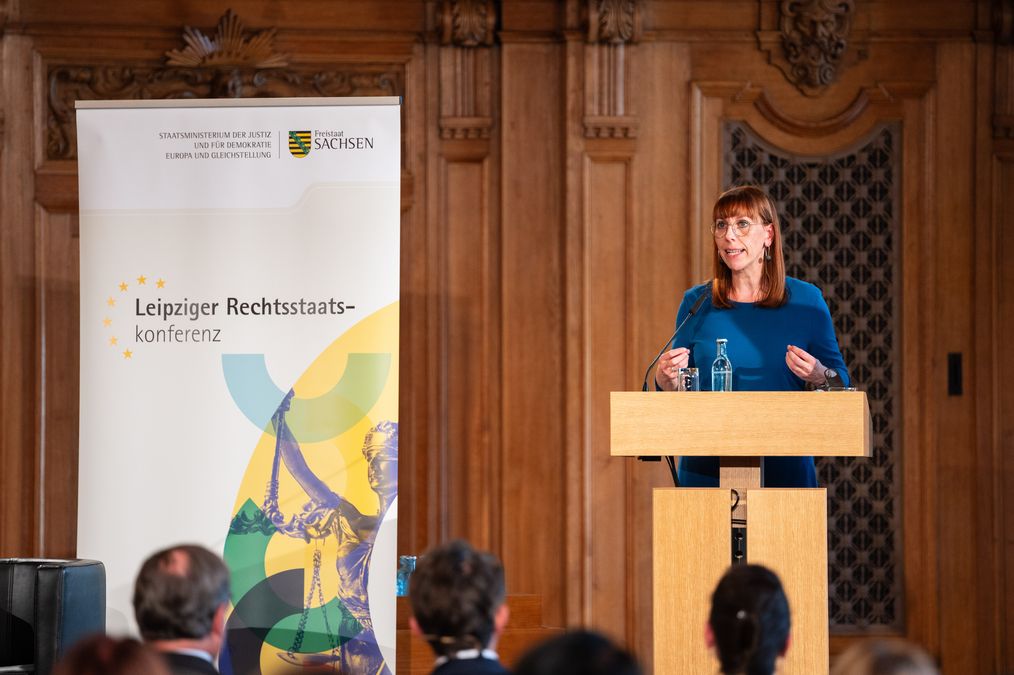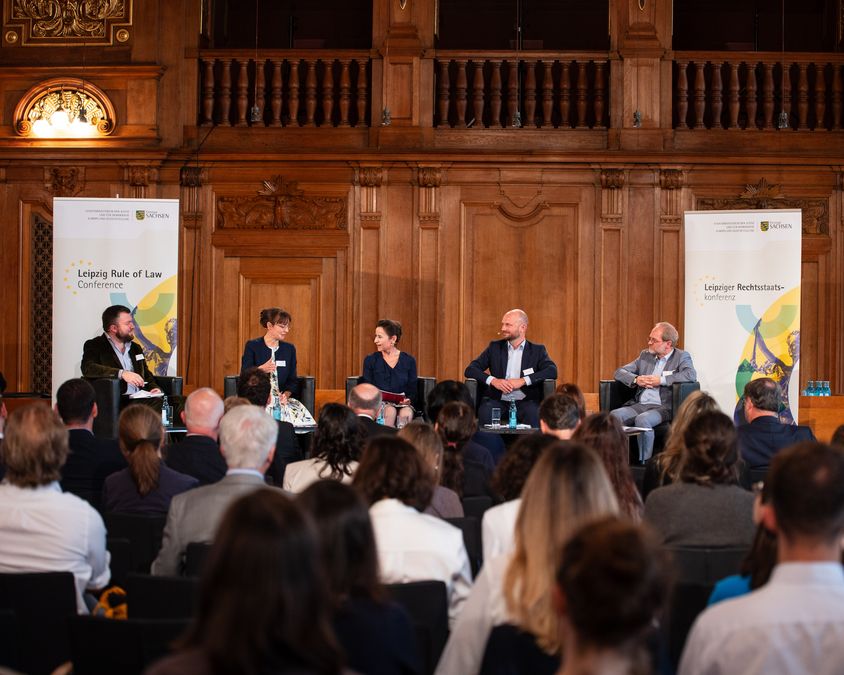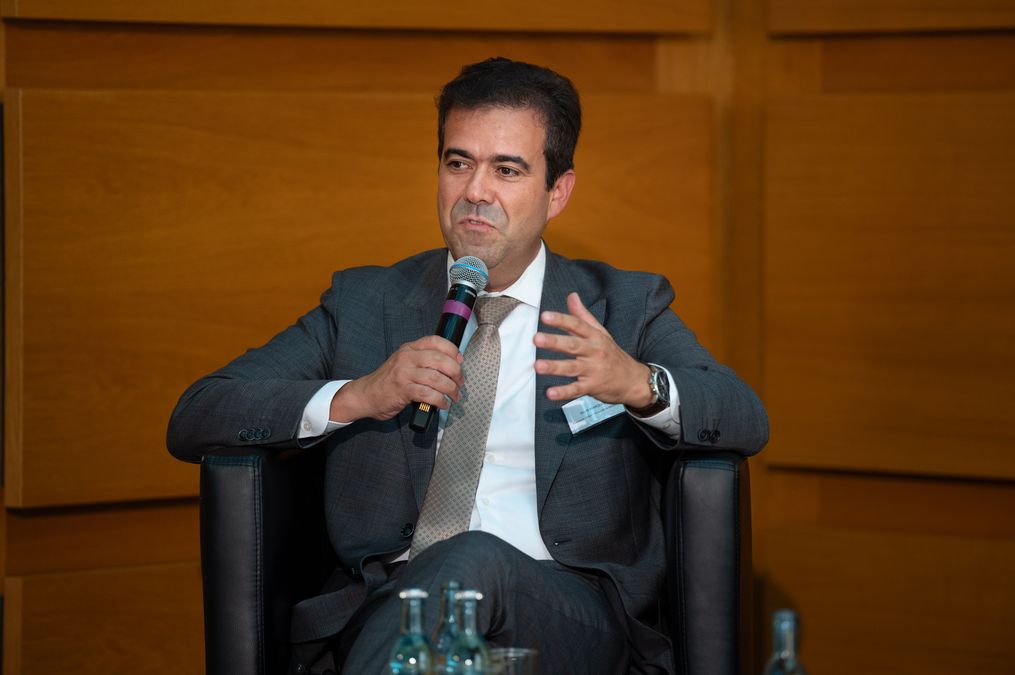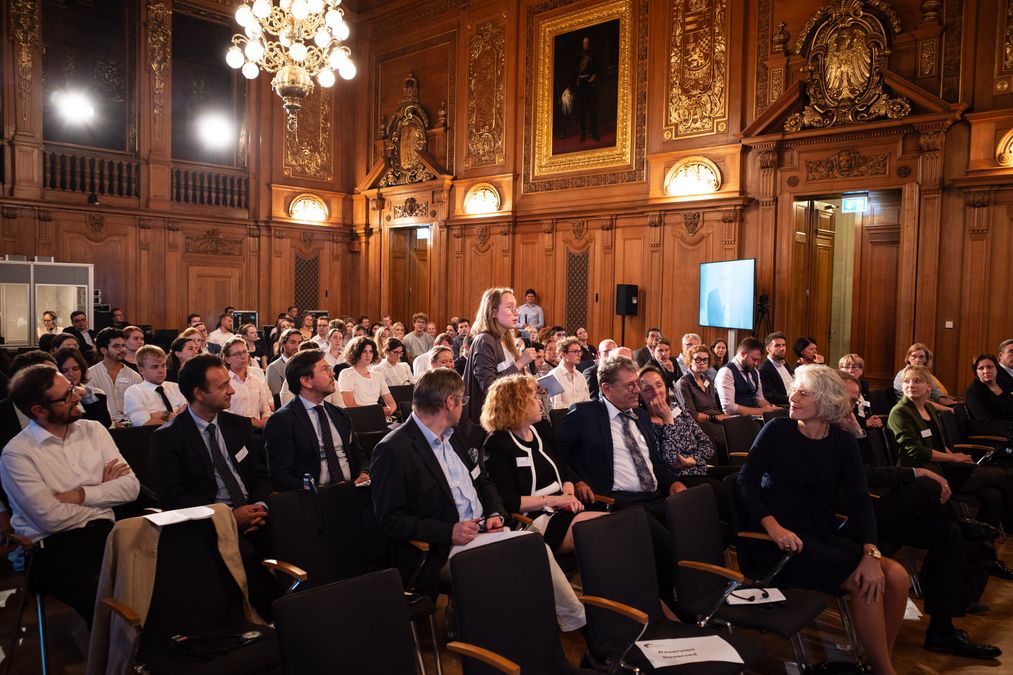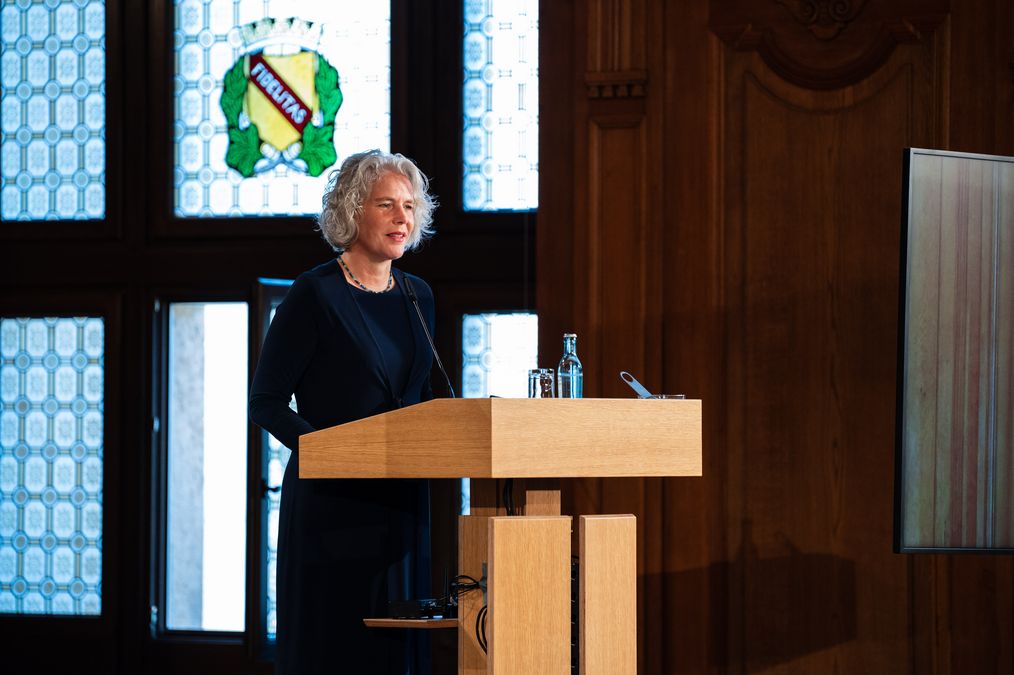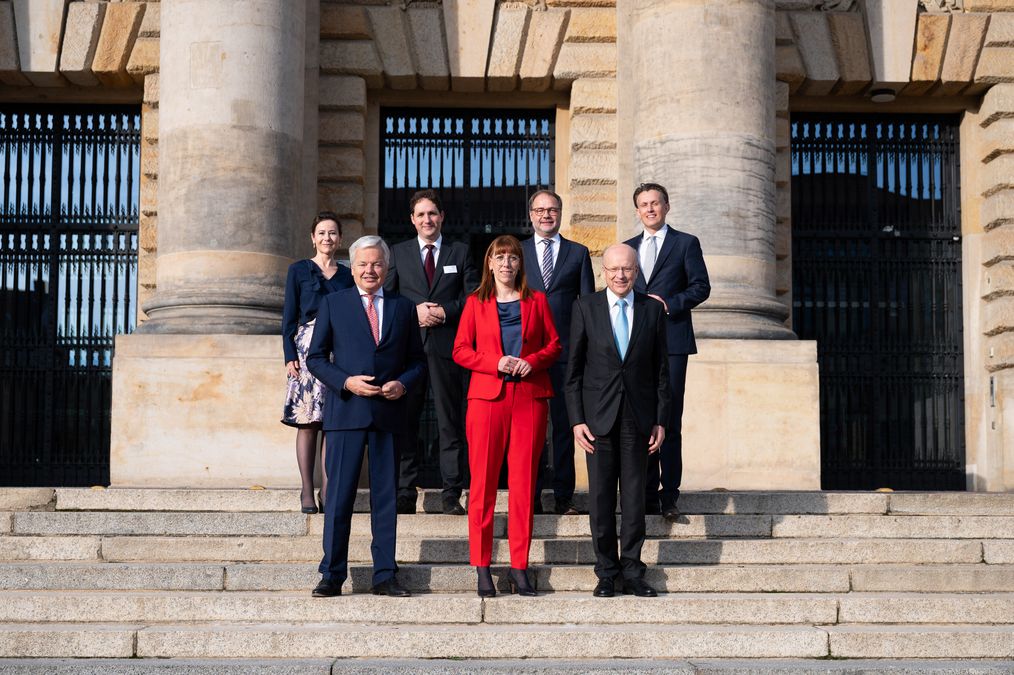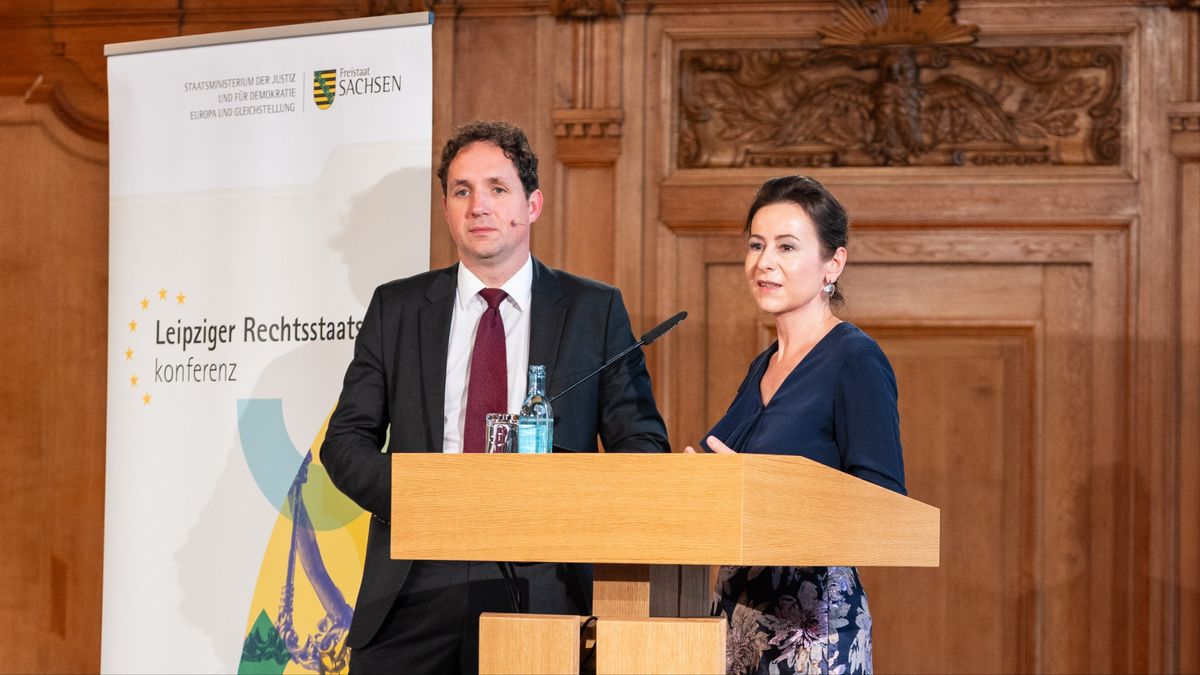Das interdisziplinäre Projekt (Laufzeit 01.10.2024 – 30.09.2027) untersucht und vergleicht Narrative zur Rolle der EU bei der Gewährleistung von Rechtsstaatlichkeit in den osteuropäischen Staaten Ukraine und Moldau sowie den ostmitteleuropäischen Staaten Polen, Tschechien, Slowakei, Ungarn, Rumänien und entwickelt Handlungsempfehlungen für die Politik gegenüber diesen Staaten.
Das Vorhaben schließt direkt an das Projekt „Rechtsstaatlichkeit in Ostmitteleuropa“ an (Laufzeit: 01.04.2021 – 31.03.2024). Dieses diente der Kartierung von Rechtsstaatlichkeitsvorstellungen in Polen, Tschechien, der Slowakei, Ungarn und Rumänien. Erfasst wurde, was Politiker und Richter unter Rechtsstaatlichkeit verstehen und wie sie sie in Relation zur Demokratie setzen.
Für das Projekt werden regionalwissenschaftliche Expertise und fachdisziplinäre Zugänge (Politik- und Geschichtswissenschaft) zusammengeführt. Das Vorhaben ist überwiegend qualitativ angelegt und kombiniert Fallstudien und Fallvergleich. Primärquellen sind vor allem Dokumente, Debatten, Gruppendiskussionen und Interviews. Das Projekt wird von einem interdisziplinär und international besetzten Expertenbeirat begleitet. Die Forschungsergebnisse werden in die Wissenschaft, akademische Lehre, politische Praxis und interessierte Öffentlichkeit transferiert.
This interdisciplinary project aims to map perceptions of the rule of law in Poland, the Czech Republic, Slovakia, Hungary and Romania. The project will show what politicians and judges understand by the rule of law and how they relate it to democracy. Sectoral, national and temporal patterns of conceiving rule of law will be captured, based on area expertise and disciplinary approaches (political science and history). The project uses a mainly qualitative methodology by combining case studies, case comparisons, and historiographical analyses for the period since 1918. Primary sources are documents, debates, and interviews. An interdisciplinary and international advisory board of experts supports the project. The research results will be transferred to science, academic teaching, political practice and the interested public.
Mitwirkende
Projektteam
- Prof. Dr. Astrid Lorenz (Gesamtleitung)
- PD Dr. Dietmar Müller
- Jan Němec, PhD
- Madeleine Hartmann
- Dorottya Víg
Ehemalige Teammitglieder
- Dr. Lisa H. Anders (nun am King's College, London)
- Marina Cucoș
- Hana Formánková (Transferassistenz)
- Gustav Gutschke (Transferassistenz)
- Lucie Jírovská
- Gergö Kónya
- Angelika Markowska (Forschungsassistenz)
- Tomasz Sekunda
Studentische & wissenschaftliche Hilfskräfte
Fellows
Horatius Dumbravă
In February 2024, Horatius Dumbravă – a judge at the Court of Appeal in Târgu Mureș and active member of the European Judicial Training Network – joins our team as a fellow. He enriches the project’s discussion with his research on the interplay between constitutional, national and European identities in the context of European integration.
Im Februar 2024 ist Horatius Dumbravă – Richter am Appellationsgericht in Târgu Mureș und aktives Mitglied des European Judicial Training Network – Fellow in unserem Team. Er bereichert unsere Diskussion mit seinen Forschungen über das Zusammenspiel von Verfassungsidentität sowie nationaler und europäischer Identitäten im Kontext der europäischen Integration.
Naum Trajanovski
Naum Trajanovski will be a fellow in Leipzig from April to June 2023. He holds a PhD in sociology and is currently working at the Faculty of Sociology, University of Warsaw, in the project “Towards Illiberal Constitutionalism in East Central Europe”. During his time in Leipzig, he works on the modes of historicising constitutional illiberalism and the crisis of the rule of law in contemporary Poland and helps the project team to contextualize the findings.
Naum Trajanovski wird von April bis Juni 2023 als Fellow in Leipzig sein. Der promovierte Soziologe arbeitet derzeit an der Universität Warschau im Projekt „Towards Illiberal Constitutionalism in East Central Europe“. Während seiner Zeit in Leipzig beschäftigt er sich mit den Formen der Historisierung des Verfassungsilliberalismus und der Krise der Rechtsstaatlichkeit im heutigen Polen und unterstützt das Projektteam hierdurch bei der Kontextualisierung der Befunde.
Martin Mendelski
In May and June 2023 Martin Mendelski comes to Leipzig. He holds a PhD in political science and works on the rule of law, anti-corruption and constitutional crises in the EU with a special focus on Eastern Europe. As a project fellow in Leipzig, he studies the dialectical interaction of the emerging European rule of law and the conflicting varieties of the rule of law at the national level.
Im Mai und Juni 2023 kommt Martin Mendelski nach Leipzig. Der promovierte Politikwissenschaftler forscht zu den Themen Rechtsstaatlichkeit, Korruptionsbekämpfung und Verfassungskrisen in der EU mit besonderem Fokus auf Osteuropa. Als Fellow in Leipzig arbeitet er zu der dialektischen Interaktion der sich Aufbau befindenden europäischen Rechtsstaatlichkeit und den konfligierenden Spielarten des Rechtsstaats auf nationaler Ebene.
Iveta Leitane
Iveta Leitane will come to Leipzig as a fellow in May and June 2023. She holds a PhD in cultural studies and currently works on a project that aims to reconstruct the link between the intellectual resistance in late socialism and the rule of law-related dissent that had developed in the last decade and supports the project team in interpreting the findings from a cultural studies perspective.
Iveta Leitane kommt im Mai und Juni 2023 als Fellow nach Leipzig. Die promovierte Kulturwissenschaftlerin arbeitet derzeit an einem Projekt zur Verbindung zwischen dem intellektuellen Widerstand im Spätsozialismus und rechtsstaatsbezogenen Konflikten der jüngeren Vergangenheit und unterstützt das Projektteam bei der kulturwissenschaftlichen Einordnung der Ergebnisse.
Marián Sekerák
Marián Sekerák is a fellow in June and July 2023. The political scientist is an expert in the field of law and human rights in Central and Eastern Europe. During his time in Leipzig, he will develop ideas for the successful dissemination of the project's findings in the Czech Republic and Slovakia.
Marián Sekerák ist Fellow des Projekts im Juni und Juli 2023. Der promovierte Politikwissenschaftler ist Experte auf dem Gebiet des Rechts und der Menschenrechte in den Ländern in Mittel- und Osteuropa. Während seiner Zeit in Leipzig wird er unter anderem mit dem Team Ideen für die erfolgreiche Verbreitung der Projektergebnisse in der Tschechischen Republik und der Slowakei entwickeln.
Ruth Ferrero Turrión
In May and June 2022, Prof Ruth Ferrero Turrión from the Universidad Complutense de Madrid joined the project team as a fellow. She worked on the rationale for government positions on the enforcement of rule of law instruments in Poland, Hungary, Romania and Bulgaria.
Im Mai und Juni 2022 durfte das Projektteam Prof. Ruth Ferrero Turrión von der Universidad Complutense de Madrid als Fellow begrüßen. Sie forschte zu den Gründen der Regierungspositionen zur Durchsetzung von Rechtsstaatlichkeitsinstrumenten in Polen, Ungarn, Rumänien und Bulgarien.
Alexandra Iancu
In July 2022, Prof Alexandra Iancu from the University of Bucharest came to Leipzig. As a project fellow, she connects her research on rule of law and anticorruption in new democracies, which helps the project team to contextualize the research data. We are also planning deeper institutional collaboration between the respective faculties to strengthen area related expertise in political science studies.
Im Juli kam Prof. Alexandra Iancu von der Universität Bukarest nach Leipzig. Als Fellow verbindet Frau Iancu ihre vielfältige Expertise zu Rechtsstaatlichkeit mit der Forschung zu Antikorruptionsmaßnahmen in neuen Demokratien. Dies hilft dem Projektteam bei der Kontextualisierung der Projektdaten. Wir planen außerdem eine engere institutionelle Kooperation zwischen den betreffenden Fakultäten, um regionalwissenschaftliche Kenntnisse in der politikwissenschaftlichen Ausbildung zu stärken.
Nicole Olszewska
In September 2022, Nicole Olszewska from the ETH Zurich joins the project team as a fellow. She works on the transformation of political discourses on Europe's borders and EU membership in Germany, Poland, Hungary and Switzerland. As an expert of discursive social network analysis of parliamentary debates, she supports the project team in methodological terms.
Im September 2022 kommt Nicole Olszewska von der ETH Zürich als Fellow nach Leipzig. Sie beschäftigt sich mit der Transformation politischer Diskurse über Europas Grenzen und die EU-Mitgliedschaft in Deutschland, Polen, Ungarn und der Schweiz. Als Expertin für die Analyse von Parlamentsdebatten unterstützt sie das Projektteam in methodischer Hinsicht.
Iulian Groza, Institute for European Policies and Reforms (IPRE), Moldova
Doc. Dr. habil. Petra Guasti, PhD, Karls-Universität Prag, Institut für Politikwissenschaft
Prof. Dr. Oksana Holovko-Havrysheva, Universität Lviv, Western Ukrainian Research Center for European Studies (Jean Monnet Center of Excellence)
Dr. Alexandra Alina Iancu, Universität Bukarest, Abteilung für Politikwissenschaft
Prof. Dr. Claudia Kraft, Universität Wien, Institut für Zeitgeschichte
Prof. PhDr. Silvia Miháliková, Slowakische Akademie der Wissenschaften, Institut für Soziologie und Comenius-Universität Bratislava
Prof. Laurent Pech, Middlesex University London, Department Law
Kálmán Pócza, PhD, Katholische Péter-Pázmány-Universität Budapest, Institut für Internationale Studien und Politikwissenschaft
Prof. Dr. Krzysztof Ruchniewicz, Universität Wrocław, Willy-Brandt-Zentrum für Deutschland- und Europastudien
Publikationen
- Lorenz, A./Anders, L.H./Müller, D./Němec, J. (2024). Narrating the Rule of Law. Patterns in East Central European Parliaments, Wiesbaden: Springer VS. Open Access
- Anders, L.H./Lorenz, A./Müller, D./Němec, J. (2024). Rule of Law in East Central Europe (Re-Act) – Sources and Methods Handbook. GlobeData, V1. Open Access.
- Katja Meier, Astrid Lorenz und Mattias Wendel (Hg.) (2023): Rechtsstaatlichkeit und die Justiz, Leipzig: Universität Leipzig 2023 (Open Access).
- Katja Meier, Astrid Lorenz and Mattias Wendel (eds.) (2023): Rule of Law and the Judiciary. Baden-Baden: Nomos (Open Access).
- Lorenz, A./Němec, J./Müller, D./Hartmann, M./Víg, D. (2024). Political Strategies to Overcome the Rule of Law Crisis Taking into Account National Political Discourses – The Case of East Central European EU Member States. In The Rule of Law Under Threat. Eroding Institutions and European Remedies. Hrsg. R. Böttner/H.-J. Blanke. Cheltenham: Edward Elgar (Elgar Studies in European Law and Policy).
- Lorenz, A. (2024). Constitutions and the Rule of Law. In Handbook of Comparative Political Institutions, Hrsg. Vatter, A./Freiburghaus, R. Cheltenham: Edward Elgar.
- Hartmann, M./Müller, D. i.V. (2024). Vertical power division and the rule of law – A constitutional analysis of Poland and Romania. In Political Crisis in Central Europe in the Interwar Period and Today, Hrsg. M. Schulze Wessel. New York/Oxford: Berghahn Press (=New German Historical Perspectives).
- Müller, D. i.V. (2024). Rule of law narratives in post-communist Romanian constitutional debates. The Constitution of 1991 in East Central European context. Out of Sync: The Uneven Development of East Central Europe since 1989, Hrsg. M. Schulze Wessel/D. Volf. (=Bad Wiesseer Tagungen des Collegium Carolinum, Bd. 43).
Kommende Veranstaltungen
Hier finden Sie rechtzeitig Informationen zu kommenden Veranstaltungen.
Zurückliegende Veranstaltungen
Hier gelangen Sie zur Webseite der Leipziger Rechtsstaatskonferenz 2024.
Am 28. und 29. September 2023 fand an der Universität Leipzig die Leipziger Rechtsstaatskonferenz statt, die das Sächsische Staatsministerium der Justiz und für Demokratie, Europa und Gleichstellung in Kooperation mit Prof. Dr. Wendel und Prof. Dr. Astrid Lorenz organisierte. Hier werden erste Projektergebnisse präsentiert.
06.06.2023
Dr. Martin Mendelski, Universität Trier
Rechtsstaatskonflikte in der EU
07.12.2022, Institutskolloquium
Dr. Julia Leib, Leipzig University
Terms of engagement: The (de)legitimation of UN peacekeeping on social media
30.11.2022, Institutskolloquium
Prof. Dr. Astrid Lorenz, PD Dr. Dietmar Müller, Dr. Lisa Anders, Universität Leipzig
Rechtsstaatlichkeit in Ostmitteleuropa: Nationale, temporale und sektorale Variation?
02.11.2022, Institutskolloquium
Prof. Holger Kern PhD, Associate Professor of Political Science at Florida State University
Transitional justice and the rule of law: Tainted judges and accountability for Nazi crimes in West Germany
Am 28. Januar 2022 fand an der Universität Leipzig die erste Trinationale Rechtsstaatskonferenz des Sächsischen Staatsministeriums der Justiz und für Demokratie, Europa und Gleichstellung statt. Re-Act-Projektleiterin Prof. Dr. Astrid Lorenz ist Kooperationspartnerin und stellte auf der Tagung das Projekt „Rechtsstaatlichkeit in Ostmitteleuropa“ vor.
In den Konferenzbeiträgen werden die Rechtsstaatlichkeit und das Justizwesen in Polen, Tschechien und Deutschland näher beleuchtet – jeweils aus rechts- und politikwissenschaftlicher Sicht. Ebenso erlangte die Einbettung der Rechtsfragen in die EU besondere Aufmerksamkeit.
Lehre
Im Wintersemester 2023/24 fanden die Forschungsergebnisse in folgende Lehrveranstaltungen Eingang:
- Lehrforschungswerkstatt zur qualitativen Inhaltsanalyse (am Beispiel der Rechtsstaatlichkeitsdiskurse in Ostmitteleuropa) - D. Müller, J. Němec, M. Hartmann, D. Víg
- M.A.-Seminar Rechtsstaatlichkeit im europäischen Mehrebenensystem - A. Lorenz
- B.A.-Vorlesung Politische Systeme - A. Lorenz
Im Wintersemester 2022/23 fanden die Forschungsergebnisse in folgende Lehrveranstaltung Eingang:
- M.A.-Seminar Rechtsstaatlichkeit im europäischen Mehrebenensystem - L. H. Anders
Im Wintersemester 2021/22 fanden die Forschungsergebnisse in folgende Lehrveranstaltungen Eingang:
- M.A.-Seminar Europavorstellungen: Utopien, Ordnungen, Institutionen - D. Müller
- M.A.-Seminar Rechtsstaatlichkeit im europäischen Mehrebenensystem - A. Lorenz
- B.A.-Vorlesung Politische Systeme - A. Lorenz
Im Sommersemester 2021 fanden die Forschungsergebnisse in folgende Lehrveranstaltung Eingang:
- M.A.-Seminar Staatlichkeit im Wandel. Strukturen und Krisen (19.-21. Jahrhundert) - D. Müller
